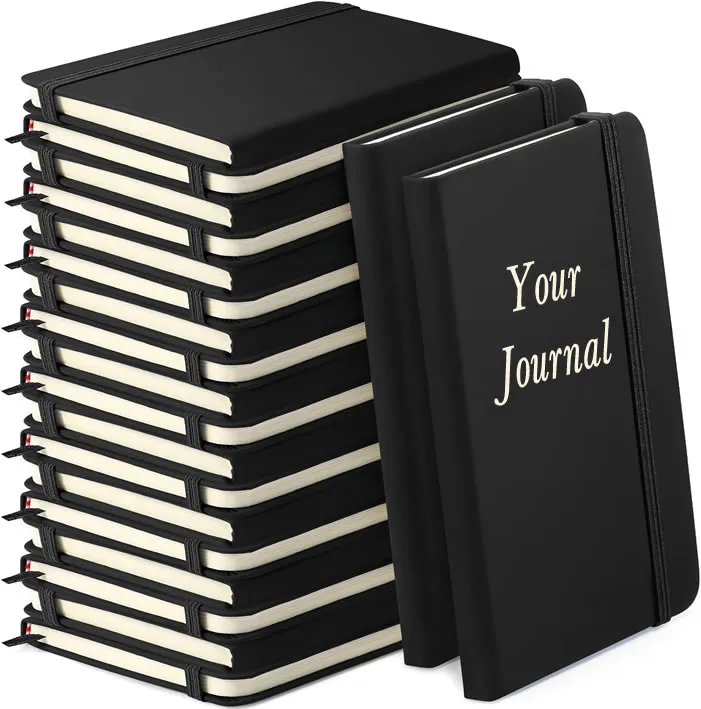

Where Is Your … JOURNAL Book?
by Bart Smith
What is a journal book?
A journal book is the kind of book you give (or sell) to clients as part of a coaching or an accountability program. These programs are usually setup to help make sure clients are making the progress they desire towards their goals or documenting when they slip or just to document the good/bad that goes on in their lives for reflection or discussion with you later if you wish.
I’m calling it a JOURNAL book because we all know what journals are and what they’re typically used for. In this special report, though, I’m going to go into a number of different types of journal books that you could write/print/sell or just give away to promote what you do for clients.
Some time ago, one of my clients asked if I could create a journal of sorts that would help her clients keep track of their goals and progress throughout the upcoming year. I said, “Sure, I know just what you need.” I proceeded to tell her about my journal book idea and she agreed it would work Within two weeks, I finished it and it was on the way to the printer.
First, while anyone can journal on the computer or on their phone, there’s something very power, even therapeutic and magical, when we actually write things down. When we write things down:


We remember things better, because we just have to look at what we wrote to remember what it was we forgot or had to remind ourselves to do/say/ask …

We reinforce something that’s important, such as, what we should / shouldn’t do, want to do or something we don’t want to repeat again …

We bring clarity and focus to what we want to work on …

We can refine what we want or need to do because we can readily review it over and over …

We can improve/change our behaviors better when we write things down and hold ourselves accountable to what we wrote.

It’s usually quiet, so our mind can think of more thoughts about what we are writing or other things that are important.

It helps us to better keep track of things. We can’t always have too many thoughts going on in our head at the one time. So, write it down and fu’get about it for awhile, get back to what we wrote down and refer to it later when needed.

Writing things down helps unload what’s on our minds so we can refer to it later if we need to or just dump it so we don’t have to think about it anymore. People who don’t have anyone to talk to or choose not to talk to someone about (X) going on in their lives can write (journal) just like talking to a coach or therapist, yet, for free. No charge!

We improve long-term focus on what we want and don’t want (for any reason).

We can document daily activities that might not seem so big or hazardous to our lives, mind, heart, budget or health. Later, though, after looking back on all those documented 2 X pint-size ice cream episodes we had last month, we realize, I actually ate 30 pints of ice cream in 30 days. WHOA, now THAT has to STOP! We toss the receipts and ice cream containers away that very day. We wash the spoons to reuse the same day. We toss the napkins we used to wipe our mouths with. (YIKES! They add up!) We do NOT throw away the penned journal entry to ourselves: I’ll just have 2 pints per week and not 8!

We collect, document and save passing thoughts that we don’t have time to run to the computer to type out. Sure, we could enter them in our phone, but then again, we have to pick up the phone, turn it on, find the Notes app, open that, create a new note … then, we can type it in the phone if we remember what we just wrote. Sure, we could dictate it in the phone, but similar procedures have to take place. Why not just write it down, really quick in that handy journal we got from our coach, therapist, advisor, etc.?

Writing things down helps unload what’s on our minds so we can refer to it later if we need to or just dump it so we don’t have to think about it anymore. People who don’t have anyone to talk to or choose not to talk to someone about (X) going on in their lives can write (journal) just like talking to a coach or therapist, yet, for free. No charge!We’re better able to “think” because we’re not worried about finding characters on a keyboard or hearing all that clickity clack as we type away. Tell someone who can’t type to “type their thoughts out in the computer.” It could take a non-typist an hour just to type three paragraphs.
Okay, I think you get how powerful it is to write things down. Can you see if you’re a coach, consultant, therapist, fitness (or other) trainer, self-help author or in a similar profession where you help people, how beneficial it might be to have such a book you could give or sell to your clients/readers? After filling in such a book, they might share what they wrote with you on a coaching call, which would allow you to better help them reach their goals.
What’s more, they’ll enjoy reading all those thoughts they wrote down in their journal versus reading them off their cold phone or clunky laptop. It sounds old school, reading out of a book, but that’s organic to our nature of learning. Reading what’s written down! Toss the tech out and stick with pen and paper for certain things that are really important.
What types of journal books are there?
Here are some journal book ideas you could write, give away or sell to clients or anyone interested in acting on your coaching tips or guidelines that they could note in a journal:
Business — If you’re a business coach, you might create a business journal that tracks the productivity of your clients’ work efforts. Perhaps they would make daily, weekly, monthly, quarterly, and/or annual entries to help document what they did or didn’t do. These could be in simple checkbox format, with room to write one sentence that summarizes a particular task or aspect of what you want them to track. Then, at the end of the day/week/month/etc., they’d enter such data into the computer to send to you so you could track what they’re up to or they could bring it to a coaching session with you and read right out of the book. The book idea is great because it lays on the desk, right next to their computer. They can keep all their current work up going on the monitor, so as not to disturb their progress during the day. They simply pick up the journal, make a note or two and put it back down. That’s the secret power of journaling. You document a little, amass a lot and review everything after certain periods of time for reflection and clarity of what you did great and what could use some attention.
Clients/Customers — You could create a journal that helps business owners (or yourself) interact with customers and clients, refunds/reasons, rave reviews/testimonials, challenges/solutions, new ideas, statements made on the phone that attracted a client your way, etc. JOT THAT STUFF DOWN! The journal is there to help make sure they’re documenting their (re)actions to the activities I just mentioned or other aspects that occur between business owners and their clients and customers.
Gratitude — Some coaches, even therapists, deal with people who are looking for purpose and meaning in their life. Well, the first thing I would do, as I welcome them to coaching with me, is to put a journal I created in their hand. Instruct them to write out 3 things every day they’re grateful for. Can be done in the morning, during the day or just before bed. Each day must be something different, although, you could have 1 that overlaps a few times. Then, some day, when they aren’t feeling their best, they just pick up the Gratitude Journal and read through the multiple entries of what they are grateful for. Wow, talk about an instant pick-me-up mental, head and heart medicine for your client, I’d say. Think of the stories they’ll tell you about how your journal helped them get through some tough times.
Goals/Expected Accomplishments — Get your clients to write our their goals (e.g., small, medium and large) and when they would like to accomplish them (i.e., set target deadlines). In this type of book, there’d be questions to answer, such as: What is your ultimate goal? Why haven’t you achieved your goal to date? What’s stopping you from achieving your goal? What do you need to do/have/get in order to achieve your goal? Questions like that, when written out, get your attention and can probably have better success achieving their goals. Having something to reflect back on, i.e., what they wrote down, helps them overcome those future obstacles so they can achieve their goal … oh, and make YOU look good as their coach.
Health, Diet, Workout — Great for fitness/health coaches to give to their clients as a gift. “Welcome to coaching with me. I’m going to give you this health and fitness journal as a gift for choosing to work with me. In it, you’ll document daily what you eat and what you do (or don’t do) for exercise. At the end of each week, we’ll have a call to find out how you’re doing. Be honest! If you lie in your journal, you’re only lying to yourself. This is YOUR journal and YOUR life. IF you seriously want to improve your physical health, then be 100% honest. We must be able to find areas during the week/month that you need help …” You get the idea. Again, there are online journals and phone apps that do a lot of this. Perhaps your journal book could better document how to maximize those apps and programs. Still, writing down what they ate and did for their workout helps them mentally and psychologically. Writing things down gives you accountability. Then, at the end of the day/week if they chose, they can enter the data into the computer program or phone app.
Relationships — If someone’s in the type of relationship that’s not nourishing their heart, mind or soul, I always tell them to write down any verbal, physical and/or any other type of abuse, neglect, sadness they feel, etc. Sure, you could document this in your phone, but writing it out can also be restorative for a client. Then, when the day comes, and they think they have the courage to leave the relationship, which we know they should, your client just has to look through his/her journal at all those entries of negativity and documented misery and use what they read through all those pages as the one and final nudge they need to get out and walk away from that relationship! Plus, you can use such information in court if necessary to justify why you left. On the flip side, if you’re in a healthy relationship, what better way to cement your feelings for one another than by documenting the good things you experience. Then, one day, you and your mate can read through all the happy moments you shared together. Wow, that sounds romantic.
Ideas, Dream, Fantasies — Again, these journals can be gifts to your clients or people you meet at events and so forth. This is your Dream Journal that you give out or sell to people. They simply make the time to write out their dreams, hopes, ideas and fantasies. People often take walks in parks, at the beach, along rivers and streams, hike through the woods … hide your phone and whip out a pen and start writing in that Dream Journal!
Marketing — How many calls did you make today? Jot them down. Sure, you could do this in the computer, but when you see it in writing, it makes a big difference. Plus, it’s faster to journal time, phone numbers, who you called and what happened when you write it versus whipping out the computer and typing it all in. Hey, do that LATER, after you’ve written down a number of actionable items. Again, we close down our computers. We turn off our screens. A journal laying in a convenient place is always ready for more entries. We can open them up and quietly sift through the pages of our activities quickly noting the good, the bad and oops, better not do that again moments. What’s more, this type of journal doesn’t take up wall space how whiteboards or calendars can. It sits nicely on your desk.
Writing / Poetry / Lyrics — This is a great one for authors, songwriters and poets who come up with great ideas and need to write them down quickly so they don’t forget. Plus, reading past notes on what you wrote can help you piece together whole poems, books or songs. You never know! Jot down song ideas, book title ideas, poem ideas, etc.
Project/Planning — A great reason to have a journal. I, myself, am always writing stuff down on scraps of paper to remember, act on, etc. Why not give your clients a Project Planning Journal to help them plan out their life, business, next project, etc.
Sales/Selling — This type of journal documents a person’s sales and selling activity/history. Jot down who you called, when, what time you ended the phone call, what was discussed on the call or at the appointment, what did you say or do right or wrong. Jot these things down. First, writing them will reinforce them in your mind and subconscious, which helps develop better behaviors and actions later. Typing things out doesn’t always help things sink into the brain. Typing more or less documents stuff you might forget later because you typed it so fast that you forget it as soon as you turned off the computer.
How do you sell (or give away) a journal book?
There are many ways to use a journal to promote what you do:

Bundled Product With Your Coaching Packages — When you get a new paying client, give them one of your journal books as part of coaching with you. Provide instructions on how to use it and have them report back to you what they wrote in their journal if that’s part of your coaching services.

Gift it to your clients. — As a gift, just give it away to clients, prospects, people you meet. “What a nice gift,” they’ll say and they’ll remember you every time they open the book to write whatever the book is intended for.

Promotional Item — If these books only cost you $2.xx to print, would it be worth it to hand them out to qualified prospects who might sign up for your coaching services? Let’s see, turn $2.xx into a $250+ paying client. Awesome! Next, as this prospect starts to write in their journal, hopefully, he/she will think of you with every pen stroke. Then, when finished with filling it all in (or part) of the journal, I’d like to think you instructed them (in the book) to call you when finished. They might be excited to take you up on that first free coaching session having invested so much time in themselves and on their own time, that you’re what they need next to take them from point A to B in their life/business/relationship.

Sell Them Individually — You could sell them your journal book separately. Sell them on your website, on Amazon.com, or hand it out when you’re networking, etc. Keep copies in your car. Give them away as a gift when someone buys one of your other books or products.

Create a “Journal Workshop” — So many of these journals are perfect for bringing people together in a group format, online or offline, as you go through the journal section by section with them; or in parts today and you’ll pick up on another section next week, etc.
What goes inside a journal book?
Here’s a proposed outline for your journal book. Feel free to create your own, but this is a great example to get you started. Just click on this link to make a copy of this from the Google doc I prepared for you.
Book Title (with meaningful purpose)
Copyright Statement
Disclaimer (Optional)
Dedication (Optional)
Message From The Author (Optional, but nice!)
Table Of Contents
Part 1: (Group of questions; up to you ….)
Part 2: (Group of questions; up to you ….)
Part 3: (Group of questions; up to you ….)
Part 4: (Group of questions; up to you ….)
Part 5: (Group of questions; up to you ….)
Summary & Wrap Up
BACK PAGES
Share Your Bio
Promote Your Services
Promote Your Products/Books
How do you print a book like this?
Since people are writing in it, you have these choices:

BOOK SIZE — Small (4” x 6”), medium (5.5″ x 8.5″) or large/manual size (8.5” x 11”). Do you want something pocket-size so people can carry it around with them and whip it out when they want to jot something down or manual size where they write in it like it was a workbook? It’s up to you and the purpose of your journal book, right?

LINES & SPACING — Books like these typically have plenty of lines to write on and very little text. Some might have a question at the top of the page and then half a page for folks to write on lines provided. Some books might not have lines to write on, but will just leave blank spaces under each question for writing thoughts down.

QUESTIONS, CHECK BOXES & COLUMNS/ROWS — You could have a journal book filled with questions, some of which might provide suggested answers via check boxes to check things off. This makes it easy for the reader. You might also have columns and rows associated with your questions that help the client enter what it is they’re supposed to enter into their journal depending on your needs.
My self-publishing book and video tutorials …
If it helps, check out my self-publishing manual and self-publishing video tutorials. They’re sure to get you fired up and in-the-know about how to write a(ny) book. From start to finish, I walk you through every step. Check ’em out. I know I wouldn’t and couldn’t write a book without the knowledge I put into my self-publishing book/courses.
# # #
THE END










